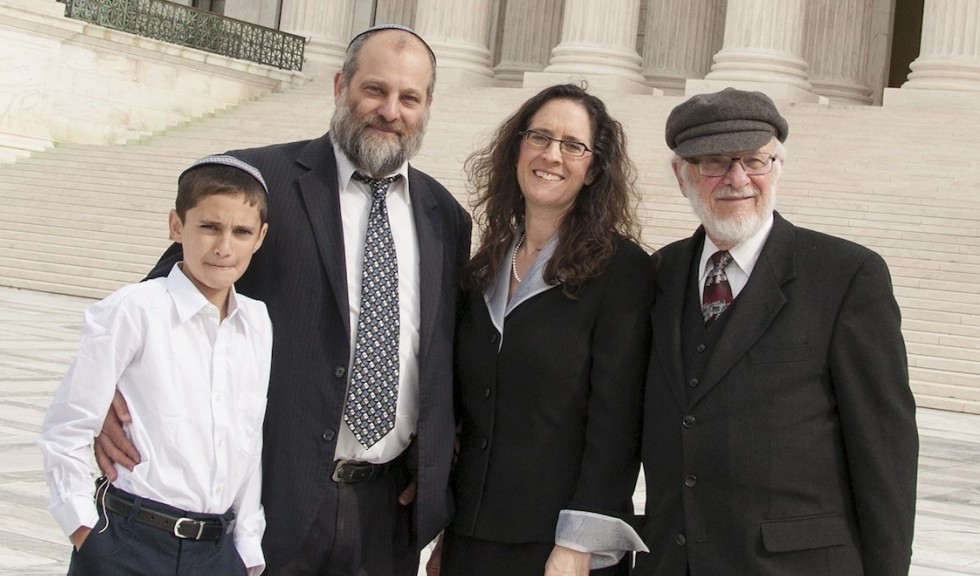US Supreme Court: Jerusalem-born Americans can’t list Israel as birthplace
In ruling backing president’s stance, legal body strikes down law permitting US citizens to cite Jewish state on passport.

Menachem Zivotofsky, left, and his father Ari posing in front of the Supreme Court with their attorney Alyza Lewin and Lewin’s father Nathan, November 3, 2014
WASHINGTON (AP) — The US Supreme Court struck down a disputed law Monday that would have allowed Americans born in Jerusalem to list their birthplace as Israel on their US passports in an important ruling that underscores the president’s authority in foreign affairs.
The court ruled 6-3 that Congress overstepped its bounds when it approved the law in 2002. It would have forced the State Department to alter its longstanding policy of not listing Israel as the birthplace for Jerusalem-born Americans.
The policy is part of the government’s refusal to recognize any nation’s sovereignty over Jerusalem, until Israelis and Palestinians resolve its status through negotiations.
Justice Anthony Kennedy said in his majority opinion that the president has the exclusive power to recognize foreign nations, and that the power to determine what a passport says is part of this power.
“Recognition is a matter on which the nation must speak with one voice. That voice is the president’s,” Kennedy wrote.
The ruling ends a 12-year-old lawsuit by a Jerusalem-born American, Menachem Zivotofsky, and his US citizen parents.
Israel’s government declined to comment. Foreign Ministry spokesman Emmanuel Nahshon said Israel does not comment on rulings by foreign courts.
Justice Antonin Scalia read a summary of his dissent from the bench, saying the Constitution “divides responsibility for foreign affairs between Congress and the president.” Chief Justice John Roberts and Justice Samuel Alito joined the dissent.
In a separate dissent, Roberts cast the court’s decision as dangerously ground-breaking. “The court takes the perilous step — for the first time in our history — of allowing the president to defy an act of Congress in the field of foreign affairs,” Roberts wrote.
Justice Clarence Thomas agreed with the outcome of the case, but on narrower grounds.
The court’s consideration of the case has coincided with acute Palestinian-Israeli tension over Jerusalem and strain in Israeli-American relations highlighted by Prime Minister Benjamin Netanyahu’s criticism of the US role in international negotiations with Iran over its nuclear program. For his part, US President Barack Obama has said he remains unconvinced by Netanyahu’s efforts to clarify pre-election statements rejecting creation of a Palestinian state.
The status of Jerusalem has for decades been among the most vexing issues in Israeli-Palestinian relations. Israel has controlled all of Jerusalem since the Six-Day War in 1967 and has repeatedly proclaimed a united Jerusalem as its eternal capital. The Palestinians have declared that East Jerusalem will be the capital of their independent state.
Indeed, Kennedy opened his opinion by noting the tensions that surround the status of Jerusalem. “A delicate subject lies in the background of this case. That subject is Jerusalem,” he said.
In the voting breakdown, the court’s four liberals, including the three Jewish justices, joined Kennedy’s opinion that sided with the administration and against the Zivotofskys.
US policy has long refrained from recognizing any nation’s sovereignty over Jerusalem and has held that the city’s status should be resolved through negotiations between the parties. Congress has for years tried to push administrations of both parties to recognize Jerusalem as Israel’s capital. The US has never enforced the passport law, on the books since 2002.
The justices had Zivotofsky’s case before them once before. In 2012, the court rejected lower court decisions that called the matter a political issue that should be resolved by Congress and the president without the help of the courts.
The federal appeals court in Washington then struck down the law as an unconstitutional intrusion by Congress on the president’s authority over foreign affairs.
Congress and the White House have argued for decades over support for Israel’s position on Jerusalem.
In 1995, Congress essentially adopted the Israeli position, saying the US should recognize a united Jerusalem as Israel’s capital. In 2002, lawmakers passed new provisions urging the president to take steps to move the embassy to Jerusalem from Tel Aviv and allowing Americans born in Jerusalem to have their place of birth listed as Israel.
President George W. Bush signed the 2002 provisions into law but noted that “US policy regarding Jerusalem has not changed.” Obama has taken the same stance.
